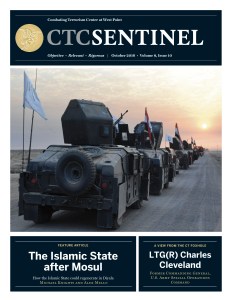From the Editor
With a constellation of Iraqi forces making slow but sustained progress toward the outskirts of Mosul, Zana Gulmohamad compares the challenges in liberating and securing the city with those faced by Iraqi forces in Fallujah earlier this year, based on interviews with key Iraqi players. Liberating Mosul, he argues, will be much more difficult because of the Islamic State’s determination to hold onto the seat of its “caliphate,” but harder still will be securing and rebuilding the city because of the conflicting agendas of the forces arrayed around Mosul.
If and when the Islamic State is dislodged from Mosul, it is likely to pivot back toward guerrilla warfare and terrorism. In our cover story, Michael Knights and Alex Mello argue there is a danger that the group could regenerate in the sectarian tinderbox of Diyala province, by escalating attacks against Shi`a in the region so as to provoke the region’s powerful Shi`a militias to retaliate against Sunnis, and plunge Iraq back into civil war. A decade ago, this strategy revitalized the Islamic State of Iraq after it was dislodged from Anbar province during the “surge.”
In our interview, Lieutenant General (Ret.) Charles Cleveland, former commanding general of U.S. Army Special Operations Command and now a senior fellow at the Combating Terrorism Center, focuses on the challenges ahead in special warfare.
In our feature commentary, two veteran U.S. intelligence officials—Andrew Liepman and Philip Mudd—reflect on the lessons learned from the 15-year counterterrorism campaign.
Brian Fishman revises the origin story of the Islamic State based on declassified documents that shed new light on why al-Qa`ida supported Abu Musab al-Zarqawi before 9/11.
Paul Cruickshank, Editor in Chief
 Skip to content
Skip to content

